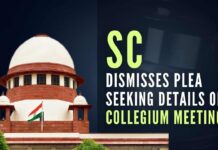
Navin Upadhyay
New Delhi, Oct 16
The following are some of the observations made by J S Khehar in his judgment…
[dropcap color=”#008040″ boxed=”yes” boxed_radius=”8px” class=”” id=””]I[/dropcap]n analyzing the conclusions drawn in the article, one is constrained to conclude, that in the process of evolution of societies across the globe, the trend is to free the judiciary from executive and political control, and to incorporate a system of selection and appointment of Judges, based purely on merit. For it is only then, that the process of judicial review will effectively support nation building…The diminishing role of executive and political participation, on the matter of appointments to the higher judiciary, is an obvious reality…It is therefore imperative to conclude, that the participation of the Union Minister in charge of Law and Justice in the final determinative process vested in the NJAC, as also, the participation of the Prime Minister and the Leader of the Opposition in the Lok Sabha (and in case of there being none – the Leader of the single largest Opposition Party in the House of the People), in the selection of “eminent persons”, would be a retrograde step, and cannot be accepted
[dropcap color=”#008040″ boxed=”yes” boxed_radius=”8px” class=”” id=””]T[/dropcap]he issue of description of the qualifications (– perhaps , also the disqualifications) of “eminent persons” is of utmost importance, and cannot be left to the free will and choice of the nominating authorities, irrespective of the high constitutional positions held by them. Specially so, because the two “eminent persons” comprise of 1/3rd strength of the NJAC, and double that of the political-executive component, and as such, will have a supremely important role in the decision making process of the NJAC. We are therefore persuaded to accept, that Article 124A(1)(d) is liable to be set aside and struck down, for having not laid down the qualifications of eligibility for being nominated as “eminent persons”, and for having left the same vague and undefined….It is difficult to appreciate what inputs the “eminent persons”, satisfying the qualification depicted by the learned Attorney General, would render in the matter of selection and appointment of Judges to the higher judiciary.
[dropcap color=”#008040″ boxed=”yes” boxed_radius=”8px” class=”” id=””]T[/dropcap]he absurdity of including two “eminent persons” on the NJAC, can perhaps be appreciated if one were to visualize the participation of such “lay persons”, in the selection of the Comptroller and Auditor-General, the Chairman and Members of the Finance Commission, the Chairman and Members of the Union Public Service Commission, the Chief Election Commissioner and the Election Commissioners and the like. The position would be disastrous. In our considered view, it is imprudent to ape a system prevalent in an advanced country, with an evolved civil society. 184. The sensitivity of selecting Judges is so enormous, and the consequences of making inappropriate appointments so dangerous, that if those involved in the process of selection and appointment of Judges to the higher judiciary, make wrongful selections, it may well lead the nation into a chaos of sorts.
[dropcap color=”#008040″ boxed=”yes” boxed_radius=”8px” class=”” id=””]I[/dropcap]n the scheme of the selection process of Judges to the higher judiciary, contemplated under the impugned constitutional amendment read with the NJAC Act, the two “eminent persons” are sufficiently empowered to reject all recommendations, just by themselves. Not just that, the two “eminent persons” would also have the absolute authority to reject all names unanimously approved by the remaining four Members of the NJAC….In our considered view, the vesting of such authority in the “eminent persons”, is clearly unsustainable, in the scheme of “independence of the judiciary”. Vesting of such authority on persons who have no nexus to the system of administration of justice is clearly arbitrary, and we hold it to be so. The inclusion of “eminent persons”, as already concluded above (refer to paragraph 156), would adversely impact primacy of the judiciary, in the matter of selection and appointment of Judges to the higher judiciary (as also their transfer). For the reasons recorded hereinabove, it is apparent, that Article 124A(1)(d) is liable to be set aside and struck down as being violative of the “basic structure” of the Constitution.
[dropcap color=”#008040″ boxed=”yes” boxed_radius=”8px” class=”” id=””]T[/dropcap]he role of appointment of Judges in consonance with the judgment rendered in the Second Judges case, envisages the dual participation of the members of the judiciary, as also, the members of the executive. Details in this behalf have been recorded by us in the “Reference Order”. And therefore, in case of any failure, it is not only the judicial component, but also the executive component, which are jointly and equally responsible. Therefore, to single out the judiciary for criticism, may not be a rightful reflection of the matter…One can only conclude by observing, that individual failings of men who are involved in the actual functioning of the executive, the legislature and the judiciary, do not necessarily lead to the inference, that the system which selects them, and assigns to them their role, is defective
[dropcap color=”#008040″ boxed=”yes” boxed_radius=”8px” class=”” id=””]T[/dropcap]he misgivings pointed out by the learned Attorney General, need to be viewed in the background of the following considerations: Firstly, the allegations leveled against the Judges in question, do not depict any lack of ability in the discharge of judicial responsibility. Surely, that is the main consideration to be taken into account, at the time of selection and appointment of an individual, as a Judge at the level of the higher judiciary. Secondly, none of the misgivings expressed on behalf of the respondents, are referable to integrity and misdemeanor. Another aspect, which cannot be compromised, at the time of selection of an individual, as a Judge at the level of the higher judiciary. Nothing wrong at this front also. Thirdly, not in a single of the instances referred to above, the political-executive had objected to the elevation of the Judges referred to. We say so, because on our asking, we were furnished with the details of those who had been elevated, despite objections at the hands of the Union-executive. None of the Judges referred to, figured in that list. Fourthly, no allegation whatsoever was made by the Attorney General, with reference to Judges, against whom objections were raised by the political-executive, and yet, they were appointed at the insistence of the Chief Justice, under the “collegium system”. Fifthly, that the political-executive disposition, despite the allegations leveled by the learned Attorney General, chose to grant post-retirement assignments, to three of the four instances referred to, during the course of hearing. A post-retirement assignment was also allowed by the political-executive, to the Judge referred to by Mr. Dushyant A. Dave. In the above factual scenario, either the learned Attorney General had got it all wrong. And if he is right, the political-executive got it all wrong, because it faltered despite being aware of the factual position highlighted. Lastly, it has not been possible for us to comprehend, how and why, a Judge who commenced to tweet his views after his retirement, can be considered to be unworthy of elevation. The fact that the concerned Judge started tweeting his views after his retirement, is not in dispute. The inclusion of this instance may well demonstrate, that all in all, the functioning of the “collegium system” may well not be as bad as it is shown to be. Thus viewed, we are satisfied, that the procedure adopted by the Parliament at the time of putting to vote the NJAC Bill, or the date on which the NJAC Act received the assent of the President, cannot invalidate the enactment of the NJAC Act, as suggested by the learned counsel for the petitioners
[dropcap color=”#008040″ boxed=”yes” boxed_radius=”8px” class=”” id=””]O[/dropcap]nce the constitutional validity of Article 124A(1) is held to be unsustainable, the impugned constitutional amendment, as well as, the NJAC Act, would be rendered a nullity…When a judgment sets aside, an amendment or a repeal by the legislature, it is but natural that the status quo ante, would stand restored. 253. For the reasons recorded hereinabove, we are of the view, that in case of setting aside of the impugned Constitution (99th Amendment) Act, the provisions of the Constitution sought to be amended thereby, would automatically revive.
[dropcap color=”#008040″ boxed=”yes” boxed_radius=”8px” class=”” id=””]C[/dropcap]lauses (a) and (b) of Article 124A(1) do not provide an adequate representation, to the judicial component in the NJAC, clauses (a) and (b) of Article 124A(1) are insufficient to preserve the primacy of the judiciary, in the matter of selection and appointment of Judges, to the higher judiciary (as also transfer of Chief Justices and Judges, from one High Court to another). The same are accordingly, violative of the principle of “independence of the judiciary”. I have independently arrived at the conclusion, that clause (c) of Article 124A(1) is ultra vires the provisions of the Constitution, because of the inclusion of the Union Minister in charge of Law and Justice as an ex officio Member of the NJAC. Clause (c) of Article 124A(1), in my view, impinges upon the principles of “independence of the judiciary”, as well as, “separation of powers”. It has also been concluded by me, that clause (d) of Article 124A(1) which provides for the inclusion of two “eminent persons” as Members of the NJAC is ultra vires the provisions of the Constitution, for a variety of reasons. The same has also been held as violative of the “basic structure” of the Constitution. In the above view of the matter, I am of the considered view, that all the clauses (a) to (d) of Article 124A(1) are liable to be set aside. The same are, accordingly struck down. In view of the striking down of Article 124A(1), the entire Constitution (99th Amendment) Act, 2014 is liable to be set aside. The same is accordingly hereby struck down in its entirety, as being ultra vires the provisions of the Constitution.
[dropcap color=”#008040″ boxed=”yes” boxed_radius=”8px” class=”” id=””]N[/dropcap]ational Judicial Appointments Commission Act, 2014 inter alia emanates from Article 124C. It has no independent existence in the absence of the NJAC, constituted under Article 124A(1). Since Articles 124A and 124C have been set aside, as a natural corollary, the National Judicial Appointments Commission Act, 2014 is also liable to be set aside, the same is accordingly hereby struck down. I have concluded, that Sections 5, 6 and 8 of the NJAC Act are ultra vires the provisions of the Constitution.
- The rise of Patanjali:An Indian yogi’s challenge to MNC giants - January 26, 2016
- Padmas – a blend of excellence, politics and ideology - January 25, 2016
- Scared of hispopularity, British wanted to hang Netaji - January 24, 2016










